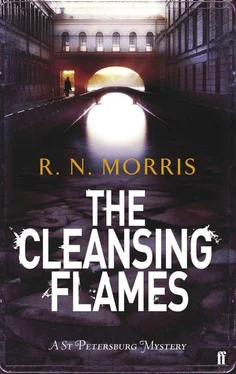R. Morris - The Cleansing Flames
Здесь есть возможность читать онлайн «R. Morris - The Cleansing Flames» весь текст электронной книги совершенно бесплатно (целиком полную версию без сокращений). В некоторых случаях можно слушать аудио, скачать через торрент в формате fb2 и присутствует краткое содержание. Год выпуска: 2011, ISBN: 2011, Издательство: Faber and Faber Fiction, Жанр: Исторический детектив, на английском языке. Описание произведения, (предисловие) а так же отзывы посетителей доступны на портале библиотеки ЛибКат.
- Название:The Cleansing Flames
- Автор:
- Издательство:Faber and Faber Fiction
- Жанр:
- Год:2011
- ISBN:0571259154
- Рейтинг книги:5 / 5. Голосов: 1
-
Избранное:Добавить в избранное
- Отзывы:
-
Ваша оценка:
- 100
- 1
- 2
- 3
- 4
- 5
The Cleansing Flames: краткое содержание, описание и аннотация
Предлагаем к чтению аннотацию, описание, краткое содержание или предисловие (зависит от того, что написал сам автор книги «The Cleansing Flames»). Если вы не нашли необходимую информацию о книге — напишите в комментариях, мы постараемся отыскать её.
The Cleansing Flames — читать онлайн бесплатно полную книгу (весь текст) целиком
Ниже представлен текст книги, разбитый по страницам. Система сохранения места последней прочитанной страницы, позволяет с удобством читать онлайн бесплатно книгу «The Cleansing Flames», без необходимости каждый раз заново искать на чём Вы остановились. Поставьте закладку, и сможете в любой момент перейти на страницу, на которой закончили чтение.
Интервал:
Закладка:
He had seen all that he needed to see, he decided. It was now a matter of urgency to get back to the apartment building in Moskovskaya District.
*
The man Virginsky had noticed before was back in place, just at the entrance to the courtyard. They confronted one another with a complicated and confused exchange of panic. Virginsky was afraid that the man might say something to him, or, even worse, that he might say something to the man. The other shook out a brief, sharp warning. This annoyed Virginsky, who felt that if anyone had the right to toss his head in warning, it was he. He glared at the man and moved on.
So, that is how things stand! thought Virginsky as he climbed the stairs.
Varvara Alexeevna let him in. ‘Where have you been?’ Her eyes tracked down and took in his workman’s clothes. A flicker of amusement undermined her attempt at severity.
‘Dolgoruky came for me.’
‘How did you get out?’
‘Dolgoruky had a key. He said the apartment is really his.’
‘That’s a lie. If he has a key he must have stolen it.’
‘I suppose that is entirely possible, knowing Dolgoruky.’
‘And how were you going to get back in if I had not been here? He locked the door behind you, did he not?’
Virgkinsky frowned and blushed in quick succession.
Varvara Alexeevna shook her head dismissively. ‘Foolish man!’
‘I had no choice. I had to go with him. He said Dyavol wanted to see me.’ Virginsky felt a tingle of self-consciousness at the lie.
‘You saw Dyavol?’
‘No. It turns out that Dolgoruky lied to me. I only saw Totsky. And Tatyana Ruslanovna.’
‘Still and all, you should not have gone out.’
Something about her use of the expression ‘still and all’ prompted Virginsky to ask: ‘Who is Dyavol, do you know?’
‘No one has ever met him, apart from Dolgoruky, and Botkin, and maybe a few others.’
‘Tatyana Ruslanovna?’
‘Perhaps.’
‘Pseldonimov?’
‘Why do you ask about Pseldonimov?’
‘Did you know him?’
‘He was one of our people, I know that.’
‘And now he is dead. What about Kozodavlev? Had he ever met Dyavol?’
‘Why are you asking me these questions? Like a. . like a magistrate!’
‘Forgive me. It is an unpleasant habit of mine. I used to be a magistrate. Until very recently, in fact. I still have the magistrate’s instincts. I can’t help myself.’
‘It is a habit you had better get out of. It will not stand you in good stead with our people.’
‘Yes, of course.’ And although he tried to, he could not resist another question. Indeed, he was not even aware of asking it: ‘Where is Kirill Kirillovich?’
‘He will not be back for another hour or so. Now, if you will forgive me, I wish to rest until Kirill Kirillovich’s return.’ Varvara Alexeevna did not look at him as she said this. Neither did she wait for his courteous bow, before disappearing into the bedroom. He heard the scratch of the hook slotting into its eye, locking the door.
Virginsky moved along the hallway. The light in the apartment was more diffuse now, the flaring panels of sunlight gone. He wondered how long he had spent chasing around after Dolgoruky. His grumbling stomach told him it must have been the best part of the day.
As he entered the main room he saw his service uniform draped over the sofa, almost as if there was a man — a strange two-dimensional, headless man — sitting there. It seemed that Varvara Alexeevna must have arranged the clothes like this deliberately, perhaps to give him a shock when he came in. Or perhaps her motives were more subtle and psychological: the bottle-green frock coat with the polished brass buttons was a reminder of the man he had once been; it could also be intended to serve as a warning of the powers aligned against him now.
But really, he had to smile at Varvara Alexeevna’s stupidity. What if someone had come in and searched the apartment while they were out? He thought about knocking on her door and pretending to be angry about it. While he was at it, he would ask her about food.
But then a furtive embarrassment came over him as he tried to remember where he had left the clothes when he had changed out of them. On the floor in the couple’s bedroom, he surmised. He remembered her rebuke of ‘Foolish man!’ He realised that her displaying the uniform in that manner was just another way of saying the same thing.
So must he hide them, or even destroy them? The simplest and most effective way to achieve the latter would be to burn the clothes, feeding them into the couple’s stove. But the idea repelled him in a way he could not fathom. He bundled the clothes up hurriedly and stowed them beneath the table. It was hardly a permanent solution but somehow it freed him to concentrate on what he needed to do.
He crossed to the window, or rather to the wall beside the window, doing his best to keep out of sight of anyone watching the apartment. The room was on the same side of the corridor as the bedroom, so that its window also overlooked the courtyard. Virginsky peered down. The man was still there.
There was a small escritoire in the corner of the room. Virginsky found writing paper and pens in the drawer and drafted his initial report, which he made sure fitted onto one side of paper. He folded the sheet into a paper dart, with the plain side out.
This time Virginsky stood in full view of the window. The man in the courtyard bristled to attention. They exchanged minute nods, understanding one another’s gestures perfectly despite the distance between them. There was no one else in the courtyard. Virginsky opened the casement window, wincing at the creak of its hinges, and threw out the dart.
The man in the courtyard seemed determined to disregard the missile. As soon as it began its twisting descent, he looked sharply away from it, and continued to ignore it after it had landed. A terrible thought struck Virginsky: what if the fellow was not the man he had taken him to be? That is to say, what if he was exactly what he appeared to be, an idle loiterer, or even a burglar in waiting? Worse still, what if he was wholly and dangerously mistaken about him; that is to say, he was not a police agent, but one of ‘our people,’ watching the apartment for any slips on his part, a slip of precisely the kind he had just committed.
At last, as if in response to a signal, the man began to walk across the courtyard, though without looking down at the paper dart on the ground. Even so, he was walking straight towards it.
Virginsky’s heart was pounding hard. Surely he had not been mistaken? Porfiry Petrovich had promised him that there would be a man in place, through whom he would be able to communicate. This fellow had to be that man. But if he were not, Virginsky had just, in all probability, written his own death warrant.
The man stooped and retrieved the dart, moving on without opening it. He glanced up at the window. Virginsky tried to interpret his look, for he felt that it must contain the secret of his own fate. But the look was all too brief and utterly inscrutable.
Virginsky turned to the mantelpiece to consult the ormolu clock, wondering how much longer he would have to wait for something to eat. But he saw that Varvara Alexeevna had removed it. Its absence struck him as pointed, and yet he felt a strange sense of injustice at this. After all, it was Botkin who had threatened to smash the clock, not him. Whatever else she might think of him, she had no reason to believe he was a vandal, or a thief.
*
In the adjoining room, Varvara Alexeevna lay on top of the bed, overwhelmed by the sensation of her heartbeats resonating throughout her body. She felt as though her core had been drained from her, leaving a vacuum that seemed to be expanding all the time, pressing up against her epiglottis. It was as if she was on the brink of regurgitating her soul, or what her soul had become now that she no longer believed in it.
Читать дальшеИнтервал:
Закладка:
Похожие книги на «The Cleansing Flames»
Представляем Вашему вниманию похожие книги на «The Cleansing Flames» списком для выбора. Мы отобрали схожую по названию и смыслу литературу в надежде предоставить читателям больше вариантов отыскать новые, интересные, ещё непрочитанные произведения.
Обсуждение, отзывы о книге «The Cleansing Flames» и просто собственные мнения читателей. Оставьте ваши комментарии, напишите, что Вы думаете о произведении, его смысле или главных героях. Укажите что конкретно понравилось, а что нет, и почему Вы так считаете.












